第10章 CHAPTER II HOW BERT SMALLWAYS GOT INTO DIFFICULTIE
It did not occur to either Tom or Bert Smallways that this remarkable aerial performance of Mr. Butteridge was likely to affect either of their lives in any special manner, that it would in any way single them out from the millions about them; and when they had witnessed it from the crest of Bun Hill and seen the fly-like mechanism, its rotating planes a golden haze in the sunset, sink humming to the harbour of its shed again, they turned back towards the sunken green-grocery beneath the great iron standard of the London to Brighton mono-rail, and their minds reverted to the discussion that had engaged them before Mr.
Butteridge's triumph had come in sight out of the London haze.
It was a difficult and unsuccessful discussions. They had to carry it on in shouts because of the moaning and roaring of the gyroscopic motor-cars that traversed the High Street, and in its nature it was contentious and private. The Grubb business was in difficulties, and Grubb in a moment of financial eloquence had given a half-share in it to Bert, whose relations with his employer had been for some time unsalaried and pallish and informal.
Bert was trying to impress Tom with the idea that the reconstructed Grubb & Smallways offered unprecedented and unparalleled opportunities to the judicious small investor. It was coming home to Bert, as though it were an entirely new fact, that Tom was singularly impervious to ideas. In the end he put the financial issues on one side, and, making the thing entirely a matter of fraternal affection, succeeded in borrowing a sovereign on the security of his word of honour.
The firm of Grubb & Smallways, formerly Grubb, had indeed been singularly unlucky in the last year or so. For many years the business had struggled along with a flavour of romantic insecurity in a small, dissolute-looking shop in the High Street, adorned with brilliantly coloured advertisements of cycles, a display of bells, trouser-clips, oil-cans, pump-clips, frame-cases, wallets, and other accessories, and the announcement of "Bicycles on Hire," "Repairs," "Free inflation," "Petrol,"and similar attractions. They were agents for several obscure makes of bicycle,--two samples constituted the stock,--and occasionally they effected a sale; they also repaired punctures and did their best--though luck was not always on their side--with any other repairing that was brought to them. They handled a line of cheap gramophones, and did a little with musical boxes.
The staple of their business was, however, the letting of bicycles on hire. It was a singular trade, obeying no known commercial or economic principles--indeed, no principles. There was a stock of ladies' and gentlemen's bicycles in a state of disrepair that passes description, and these, the hiring stock, were let to unexacting and reckless people, inexpert in the things of this world, at a nominal rate of one shilling for the first hour and sixpence per hour afterwards. But really there were no fixed prices, and insistent boys could get bicycles and the thrill of danger for an hour for so low a sum as threepence, provided they could convince Grubb that that was all they had.
The saddle and handle-bar were then sketchily adjusted bv Grubb, a deposit exacted, except in the case of familiar boys, the machine lubricated, and the adventurer started upon his career.
Usually he or she came back, but at times, when the accident was serious, Bert or Grubb had to go out and fetch the machine home.
Hire was always charged up to the hour of return to the shop and deducted from the deposit. It was rare that a bicycle started out from their hands in a state of pedantic efficiency. Romantic possibilities of accident lurked in the worn thread of the screw that adjusted the saddle, in the precarious pedals, in the loose-knit chain, in the handle-bars, above all in the brakes and tyres. Tappings and clankings and strange rhythmic creakings awoke as the intrepid hirer pedalled out into the country. Then perhaps the bell would jam or a brake fail to act on a hill; or the seat-pillar would get loose, and the saddle drop three or four inches with a disconcerting bump; or the loose and rattling chain would jump the cogs of the chain-wheel as the machine ran downhill, and so bring the mechanism to an abrupt and disastrous stop without at the same time arresting the forward momentum of the rider; or a tyre would bang, or sigh quietly, and give up the struggle for efficiency.
When the hirer returned, a heated pedestrian, Grubb would ignore all verbal complaints, and examine the machine gravely.
"This ain't 'ad fair usage," he used to begin.